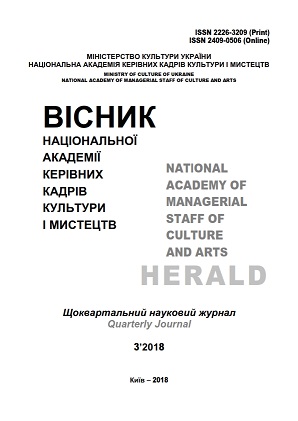Онтологічний аспект залучення до творчості Й.С. Баха та до символіки духовної християнської музики
Ontological Aspect of Familiarizing with the Creative Work of J.S. Bach and to the Symbolism of Spiritual Christian Music
Author(s): Galina Viktorivna VolkovaSubject(s): Christian Theology and Religion, Music, Ethics / Practical Philosophy, Social Philosophy, 17th Century, 18th Century, Ontology, History of Art
Published by: Національна академія керівних кадрів культури і мистецтв
Keywords: ritual; musical ontology; musical symbols; style in music; morally-cultivating sense of music;
Summary/Abstract: Goal – to identify the spiritual and moral guidelines of a great musician according to the notions about the spiritual values of modern Ukraine in the presentation of the theme "Creativity of J. S. Bach" in a music school at the level of V class. The methodology - cultural, interdisciplinary approach, as well as musicological hermeneutics in the interpretation of semantic fillings of creativity J.S. Bach. The scientific novelty - for the first time in the practice of studying the theme "Creativity of J.S. Bach" emphasis is placed on the denominational peculiarities of Pietism-Lutheranism, which differ, due to objective historical circumstances, by parallels to the religious-orthodox principles that are understood to a large extent by those who study. Conclusions - nomination of ritually organizing the stimulus of expression, justified by the deep religiosity of the composer and direct support of him in the adopted Lutheran life melodies of hymns in the analysis of works of Bach recommended for study in the musical school (in this case it is Cantata No. 21 and Prelude and Fugue C-dur from the first and second The Well-Tempered Clavier). The latter capture in the artistic whole the moral and behavioral complex, which is indicative for the Lutheran-Pietist, and which has a collision with the Orthodox ethics of the joy of perception of the world as the basis for moral orientation in the world. Special meaning is emphasizing in the text and in the music recommended for showing in the lesson of Cantata No. 21 of the aspect of rejection of disbelief, that is, the departure from negative emotions as incompatible with church affection, in the execution of the highlight of the presentation, and in the perception – of sensitivity to it. This same attention to the temptation and to the emotional positive expression is important in the hearing-perception of the Invention (two-voiced C-dur and F-dur) and the Prelude and Fugue C-dur (I v. of The Well-Tempered Clavier). Thus, the educational and cognitive complex is connected with the moral-educators, as it is laid by the music of J.S. Bach.
Journal: Вісник Національної академії керівних кадрів культури і мистецтв
- Issue Year: 2018
- Issue No: 3
- Page Range: 382-386
- Page Count: 5
- Language: Ukrainian

